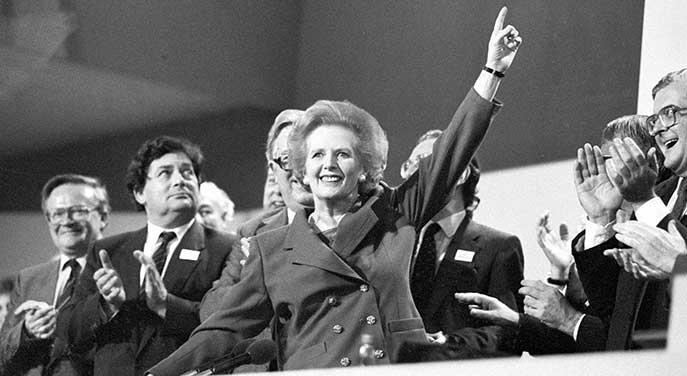 On April 2, 1982, Argentina invaded the Falklands – the archipelago of islands that constitute a British Overseas Territory in the remote South Atlantic.
On April 2, 1982, Argentina invaded the Falklands – the archipelago of islands that constitute a British Overseas Territory in the remote South Atlantic.
Although initially shaken by the event, British Prime Minister Margaret Thatcher quickly regained her footing and dispatched a naval task force to rectify the situation.
During the weeks it took for the task force to make the trip from Southampton to the South Atlantic, there was much diplomatic scurrying in search of a peaceful resolution. But it all came to naught, thanks in significant measure to Argentinian intransigence.
So the task force evicted the invaders and Thatcher’s reputation soared, particularly at home.
The Falklands were uninhabited when initially discovered in 1690 by an English sea captain called John Strong, who named the strait between the main islands after the British official who’d sponsored his expedition. Subsequent claims were made by France and Spain, with Argentina assuming the Spanish claim on becoming independent in 1816. The British, however, reasserted their rights in 1833.
By 1982, the Falklands had around 1,800 inhabitants and they were very clear about their wishes. They wanted nothing to do with either Argentina or its dictatorship.
Given the 13,000-km distance between Britain and the Falklands, American support was always going to be vital for the success of Thatcher’s task force. But the Americans were very uncomfortable.
To them, three things mattered:
- they were neutral on the question of whose claim to sovereignty was most valid;
- they disapproved of Argentina’s invasion;
- they absolutely didn’t want to have to choose between Britain and a Latin American state.
Washington had two distinct camps. The camp led by U.S. Secretary of State Alexander Haig and U.S. Ambassador to the United Nations Jeane Kirkpatrick believed the relationship with Latin America took precedence. The other camp, headed by U.S. Secretary of Defence Caspar Weinberger, was clearly on Britain’s side.
Despite his high regard for Thatcher, U.S. President Ronald Reagan was personally ambivalent. He wanted to avoid military conflict and thus actively supported various compromise scenarios. At times during the crisis, his attitude thoroughly irked Thatcher.
Still, there was never much doubt as to where Reagan would ultimately come down.
Speaking to Kirkpatrick early in the crisis, he had this to say: “Look, I would love to stay friends with Argentina, but I think our first loyalty, our first order of business if worst comes to worst, is to side with the Brits.”
Meanwhile, Weinberger went to work, using the considerable degree of operational latitude Reagan habitually gave to his subordinates. His approach was simple. Discreetly provide facilities, intelligence and supplies, beginning with the offer of using the American base on Ascension Island.
And when British requests became increasingly significant and Weinberger felt it necessary to privately discuss the details with his boss, Reagan’s response was clear: “Give Maggie everything she needs to get on with it.” Weinberger enthusiastically took it from there.
The unexpected rise of Margaret Thatcher by Pat Murphy
A woman of sharp edges and a clear mind about how change would be managed
Thatcher was an outsider to the establishment of her Conservative Party, some of whom had never reconciled themselves to her leadership. And the campaign to recover the Falklands was extremely stressful for her.
She often felt isolated, surrounded by men who either didn’t believe in the mission or thought it impractical and susceptible to failure. In the opinion of one Conservative MP, “She wouldn’t have done it if she’d been a man and if she’d been in the armed forces during the war. Then she’d have been aware of how dreadfully wrong everything was likely to go.”
But it didn’t go wrong.
On June 14, Argentina surrendered. In the course of the fighting, 255 British servicemen had died.
From imperilled prime minister in April, Thatcher became triumphant war winner in June. It was a heady time. A year later, she swept to re-election.
Referring to her sobriquet as “the Iron Lady,” maverick Conservative MP Enoch Powell issued a challenge in Parliament during the early days of the crisis: “In the next week or two, this House, the nation and the right honourable Lady herself will learn of what metal she is made.”
It’s fair to say that Powell’s question was answered.
Now, 40 years on, Argentina still hankers for the Falklands and the islanders remain adamantly opposed to the idea. And both Britain and the United States are different countries, with very different leaders.
What, one wonders, would happen if Argentina tried it again?
Pat Murphy casts a history buff’s eye at the goings-on in our world. Never cynical – well, perhaps a little bit. For interview requests, click here.
The opinions expressed by our columnists and contributors are theirs alone and do not inherently or expressly reflect the views of our publication.
© Troy Media
Troy Media is an editorial content provider to media outlets and its own hosted community news outlets across Canada.


